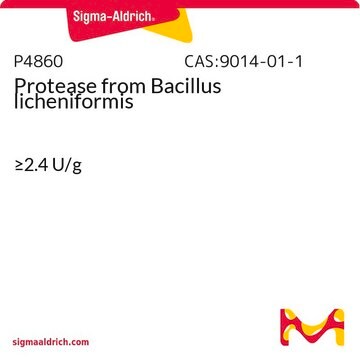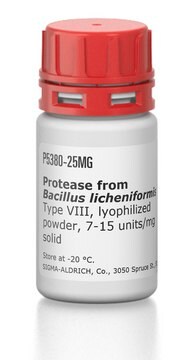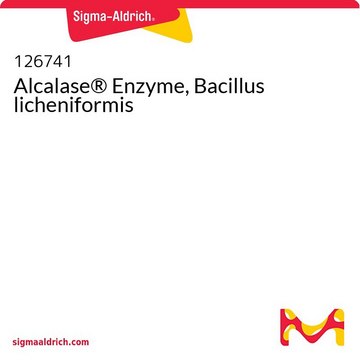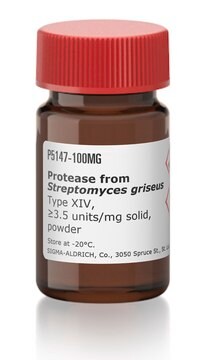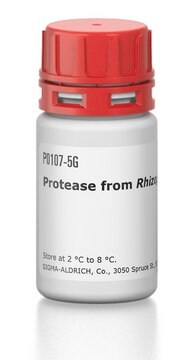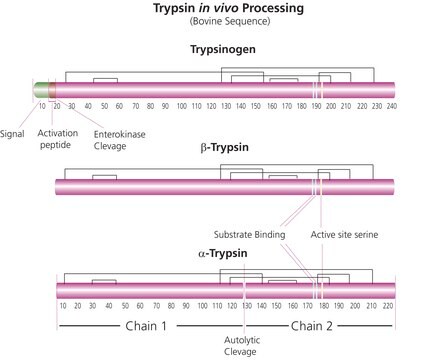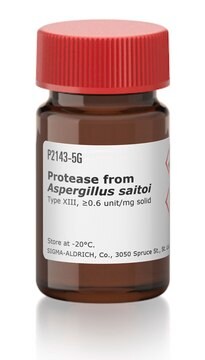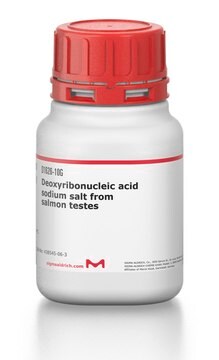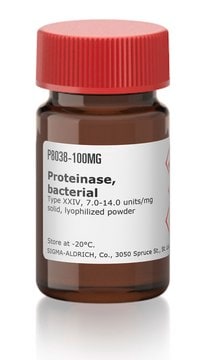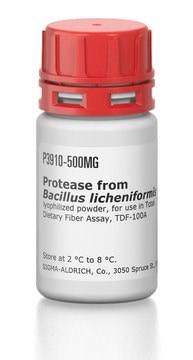P0029
Protease from Bacillus sp.
Synonym(s):
Protamex®
Sign Into View Organizational & Contract Pricing
All Photos(2)
About This Item
Enzyme Commission number:
3.4.21.14
EC Number:
MDL number:
UNSPSC Code:
12352204
NACRES:
NA.54
Recommended Products
biological source
Bacillus sp.
Quality Level
form
granular
enzyme activity
>1.5 AU-N/g
storage temp.
2-8°C
Looking for similar products? Visit Product Comparison Guide
General description
Protease from Bacillus sp. is extensively useful in pharmaceutical, leather, food and waste processing industry. It is widely used in manufacturing protein hydrolysates. Analysis of Bacillus protease stability and activity showed that the enzyme was active at all pH values from 5.0-11.0 with 100% activity at 8.0. Optimal pH for protein stability was determined to be at 7.0 while the optimal temperature for stability was at 60°C with 95% activity maintained.
Application
Protease from Bacillus sp. has been used:
- to evaluate protease inhibitor activity
- in high yields in batch fermentation using a response surface methodology
- in a study to investigate a biosensor to detect a protease biomarker from Bacillus licheniformis
Analysis Note
minimum activity 1.5 AU-N/G solid
Legal Information
Protamex is a registered trademark of Novozymes Corp.
signalword
Danger
hcodes
Hazard Classifications
Eye Irrit. 2 - Resp. Sens. 1 - Skin Irrit. 2 - STOT SE 3
target_organs
Respiratory system
Storage Class
11 - Combustible Solids
wgk_germany
WGK 2
flash_point_f
Not applicable
flash_point_c
Not applicable
Certificates of Analysis (COA)
Search for Certificates of Analysis (COA) by entering the products Lot/Batch Number. Lot and Batch Numbers can be found on a product’s label following the words ‘Lot’ or ‘Batch’.
Already Own This Product?
Find documentation for the products that you have recently purchased in the Document Library.
Customers Also Viewed
Production and properties of an extracellular protease from thermophilic Bacillus sp
<BIG>Nascimentol W, et al.</BIG>
Brazilian Journal of Microbiology, 35, 91-96 (2004)
Some properties of extracellular protease from Bacillus licheniformis LBBL-11 isolated from ?iru?, a traditionally fermented African locust bean condiment.
Olajuyigbe, FM.
African Journal of Biochemistry Research, 2, 206-210 (2008)
Sumant Puri et al.
Current microbiology, 44(4), 286-290 (2002-03-23)
High yields (1939 U/ml) of an alkaline protease were obtained in batch fermentation of a Bacillus sp. using a response surface methodology. The interaction of four variables, viz., starch, peptone, incubation time, and inoculum density, suggested inoculum density to be
Trypsin Inhibitor from Edible Mushroom Pleurotus floridanus Active against Proteases of Microbial Origin
<BIG>Ali PPM, et al.</BIG>
Applied Biochemistry and Biotechnology, 167-178 (2014)
Jan Paul Dudzic et al.
Cell reports, 27(4), 1050-1061 (2019-04-25)
The melanization response is an important defense mechanism in arthropods. This reaction is mediated by phenoloxidases (POs), which are activated by complex extracellular serine protease (SP) cascades. Here, we investigate the role of SPs in the melanization response using compound
Our team of scientists has experience in all areas of research including Life Science, Material Science, Chemical Synthesis, Chromatography, Analytical and many others.
Contact Technical Service

